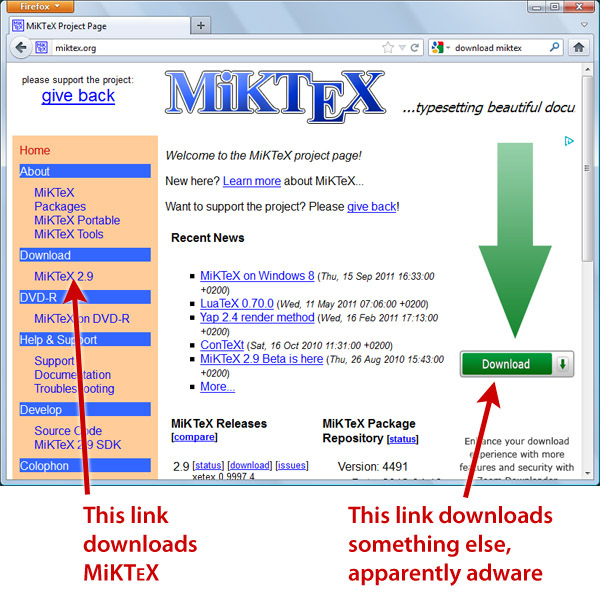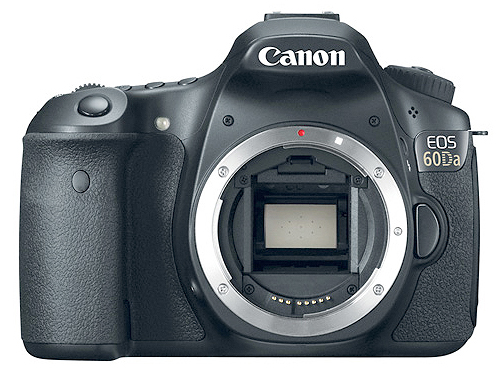 |
|
 |
| |
|
2012
April
29-30
(Extra)
|
Two quick moon shots


Here are two quick pictures of the moon, taken with a 5-inch telescope, DMK camera, and infrared-pass filter
(that is, they are infrared pictures; the moon looks very much the same in infrared as in
ordinary light). I took these just to make sure the Lenovo laptop would record and
process pictures. It turns out RegiStax runs much faster on a computer with 6 GB rather than 2 GB of RAM;
the hyper-threaded processor also helps.
The first picture includes the famous Straight Wall (Rupes Recta), actually a cliff;
the second shows the Apennine Mountains (on the moon, not the ones on earth).
Permanent link to this entry


|
2012
April
29-30
|
Linux "grub-rescue" problem and solution
Malfunction installing 64-bit Ubuntu 12.04
After experimenting with Ubuntu 12.04 LTS 32-bit, I decided to install the 64-bit version in place of it.
Although the 64-bit OS is fine, the installer doesn't seem to be quite ready for prime time.
Mysterious symptom #1 was that when booting the installation CD, I got a screen full of gibberish
(white dots on black); pressing Enter caused the bootup to proceed, and the installation went fine.
The installer offered to wipe out Ubuntu 12.04 and replace it, which is exactly
what I wanted done. So I said yes.
After installing Ubuntu, I rebooted and my PC wouldn't boot from its own hard disk.
I got the grub-rescue> prompt and,
after attempting some of the commands in the GRUB documentation, invalid arch independent ELF magic
(Linux does have a Tolkienseque twist, doesn't it?).
I had to boot from the CD again and tell GRUB (the boot manager) where to install itself.
The procedure was as described here.
In my case, specifically:
(1) I opened a terminal window by pressing Ctrl-Alt-T.
(2) The command sudo fdisk -lu /dev/sda told me my disk partitions.
In my case /dev/sda7 was the Linux boot partition.
Some computers, like the one described on the web page I just linked to,
have a Linux boot partition separate from the Linux OS partition.
In that case, follow his instructions, not mine.
(2) The command sudo mount /dev/sda7 /mnt gave me access to that disk partition.
(3) Finally, sudo grub-install --root-directory=/mnt /dev/sda made the machine bootable.
[Addendum:] I've installed 12.04 on several machines, 64-bit and 32-bit, and had this problem twice.
On one of the machines (32-bit), I had to do steps (1)-(3) twice; why the first time wasn't sufficient,
I don't know.
Permanent link to this entry


|
2012
April
26-28
|
CPU speed paradox?
A Pentium Core i5 processor with 2 cores, each hyper-threaded to have two
instruction streams, beats a Pentium Core 2 Quad processor with 4 cores.
Some of my .NET applications run as much as 50% faster, at the same CPU speed
(2.5 GHz) and with comparable RAM available (6 to 8 GB and nowhere near full).
How do I know this? Because one of them is my desktop and the other is my
new Lenovo Z570-1024 laptop.
How can this be? Apparently, it's the instruction cache, which is considerably bigger
on the Core i5 and operates differently. My program does lots of string comparisons
in .NET Framework. I'll bet there is a subroutine in .NET that fits entirely within
the cache on one CPU and not the other.
Permanent link to this entry
The weird wide world of Linux
Ubuntu 12.04 LTS is out.
This is newsworthy for two reasons.
This version of Linux will be supported for 5 years (LTS means long-term support),
so it's a good one to choose if your hobby is not changing Linux versions.
Second, this version gives you the new Unity graphical user interface rather
than the traditional Gnome.
Like many people I found Unity mystifying and was glad to find out that you
can re-enable Gnome as an alternative [link corrected].
But with a bit of poking around I'm not sure I won't stick with Unity.
Putting the taskbar on the left edge of the screen, instead of the top or bottom,
is a Good Idea now that we're mostly using 766-pixel-high widescreen laptops.
(I might even do that in Windows.)
Other good things to do with Linux are
disable the Guest account (please!)
and
port your Thunderbird and Firefox settings from Windows
(I've long used a similar method to port settings from
one machine to another).
Permanent link to this entry
Soft drink of the future?
Long ago, at Cambridge, as an alternative to carrying heavy bottles of Coke or Pepsi up to my
third-floor room, I kept a bottle of liquid concentrate orangeade ("orange squash").
About one teaspoonful per glass of water made a nice orange drink.
I figured it couldn't be as sugary as Coke or Pepsi because a teaspoon of concentrate
can't contain more than a teaspoon of sugar.
Today I decided to look for such things in an American grocery store (35 years and 5000 miles away!)
and didn't find anything quite like it.
But I did find Mio, which is a very
concentrated flavoring to add to drinking water.
Orange Mio isn't half bad. Now that the University gives away filtered drinking water
and we all carry water bottles, I think I'll start bringing a bottle of Mio concentrate
with me.
Permanent link to this entry


|
2012
April
25
(Extra)
|
Google searches are redirected to 63.209.69.107
We go for years between computer virus infections, but this evening one of
Melody's computers got one. The symptom was that some (not all) Google searches
were being redirected to a useless site called 63.209.69.107 which looks like
a defunct "answers" site of some kind.
We did the following two things:
- Ran a full scan with Microsoft Security Essentials (which had not detected the virus on the fly).
- Downloaded the free trial of Malwarebytes and ran a full scan.
That got rid of the problem. The first alone may have been sufficient — we're not sure.
This was a "TDSS
rootkit" virus that eludes most antivirus software.
In this case Kaspersky TDSSkiller (perhaps not the current version) didn't get it.
Permanent link to this entry
Lenovo Z570-1024 AC adapter = Toshiba A205-S843 AC adapter
To my delight, my new Lenovo laptop takes the same AC adapter (power supply)
as our Toshiba A205's bought in 2008. (Melody is keeping hers and I'm probably
going to sell mine, since the Lenovo is its replacement.)
Please don't take my word for it. Verify polarity, voltage, and current (amperage)
yourself. Laptops are NOT designed to survive attempts to use the wrong AC adapter!
The Toshiba's voltage is about 5% lower, but that doesn't make a difference.
Imported replacement power supplies are abundant on eBay for about $12 and even less,
and we bought several a few years ago. Now the Lenovo need never go hungry!
Permanent link to this entry


|
2012
April
25
|
The end of scientific journals as we know them
The prestige of some of them is simply too high!
There's a revolution brewing in the world of scientific publishing.
Scientific journals as they presently exist must change or die.
For my readers who are not scientists, I should explain the difference
between a journal such as Astronomical Journal and a magazine
such as Sky and Telescope:
- The purpose of a magazine is to be popular and, ultimately,
entertain a large audience. The articles in it are
chosen by the editor.
- The purpose of a journal is to publish scientists' original
reports of important research even if only a few people read it.
The articles are chosen for importance, not popularity, and are
peer-reviewed. That means they are rated by a panel of scientists
chosen for each specific research topic, not a single editor.
I knew that journal subscriptions could be expensive. Many important
journals go almost exclusively to libraries — with one copy for each whole university —
and have very few individuals as subscribers. Such a journal might sell only 200 or 300 copies
of each issue, yet they still have to maintain an editorial staff. So a subscription
might cost as much as $1000 per year.
What I didn't know until recently was two other things:
- The price of journals has been going up faster than inflation for decades,
even though new technology should have lowered the cost.
(Word processing is much cheaper than old-style typesetting.
And many journals are now delivered as computer files on the World Wide Web
rather than printed copies. Both of these should have caused costs to plummet.)
- Quite a few journals are exorbitantly expensive, in the $10,000 to $20,000
category. Here's
a list from 2005 and the situation
has only gotten worse since then.
What went wrong? Some say publishers are greedy,
and even organize boycotts,
but I don't think that's the whole of the problem.
Looking at the most expensive journals, I see that they are in sciences that
are prestigious but practiced by relatively few researchers,
such as nuclear physics, not clinical medicine.
In that situation, it is common for a subfield to be dominated by one or two high-prestige journals
for a long time. With an explosively growing population of scientists, all of whom consider those
journals absolutely indispensable, we have a perfect storm of excess demand, with everyone
wanting their university to spare no expense to get the essential journals.
I should add that each scientific paper only gets published once, so no journal is a substitute
for any other. If all the scientists in a subfield agree that a particular journal is the one
(such that you must publish in it in order to be respected, and you must read it in order to make progress),
then the whole subfield is at the mercy of that journal.
I don't fault the publisher for charging as much as the market will bear. That is normal business.
But I think the market needs to decide what not to bear!
We need to promote the notion that if a journal prices itself out of the market, it loses its prestige.
Maybe the journal used to be great, but if it's unaffordable now, it's not great now.
Harvard University is in fact threatening to drop some overpriced journals. And when Harvard drops a journal,
that's like taking an axe to its prestige. If Harvard, MIT, Yale, Oxford, and Cambridge were to agree to drop a journal,
that would thoroughly stigmatize it as a has-been.
The gorilla in the room is the Internet. We no longer need publishers to gather and
print scientific papers in order for us to see them. In the old days, some research labs
published their own "technical reports" and sold copies at low cost to anyone interested.
Nowadays any scientist can put his papers on his own Web page, and people using search engines
will quickly find them.
The problem is, self-publishing has no prestige. Self-published papers have not been reviewed
by anybody but the author — you don't know if they're important or even if they contain egregious errors.
So how do we bring back what is good about scholarly journals, while escaping the high cost?
I can see two mechanisms.
Bottom-up, we can encourage self-publishing, and support it with services that provide permanent
archiving (so the paper has a fixed URL even if the author moves on),
indexing, and quality rating. The rating might even be done by people who read the papers,
just the way reviewers on Amazon rate products (and rate the reviews for usefulness, so that a review
that points out a real benefit or a real flaw carries more weight than one that merely likes or dislikes the product).
Top-down, we should rethink where scientific journals come from.
Some are started by publishers as commercial ventures. Those I leave to sink or swim.
Others, though, are started by scientific organizations as a way for their members to share research.
There lies the future, I think. Already, the Association for Computational Linguistics has
made their journal
open access, which means that anyone is free to read it on the Web.
It is still peer-reviewed and every bit as good as before. The cost of production is borne by
the members' dues.
I predict that in a few more years, the two approaches will merge, and a new model of scholarly
publishing will emerge. It's quite possible that authors, or their universities, will have to pay
the costs of editing, indexing, and archiving — the things that publishers do — since
the publishers will be getting no income from readers. But the total cost should be much, much
lower.
Besides a gorilla in the room, there is also a red herring, something that threatens
to mislead us. That is impact factor, the average number of times that each article
in a journal is cited by some other article (in any journal) in a year.
This is a clear, objective measure of the importance of a journal. Right?
Wrong. Impact factor is useful in comparing different journals in the exact same subfield,
but mostly it measures whether a lot of people are doing research on the same thing.
Not surprisingly, Schizophrenia Research has an impact factor around 4.5; the medical
research community is big, and schizophrenia is a hot topic. But a perfectly good mathematical
journal might have an impact factor of 0.5 or less. That doesn't mean the quality is low,
only that the researchers are not in a feeding frenzy. Often a very important paper gets no
citations at all for the first several years, and then somebody figures out why it's
important.
That is why I'd like to see impact factor replaced by better measures of the quality of
scientific research. Bottom line: If it has to be immediately useful, it isn't science.
I thank Rob Caskey and Owen Shelton for bringing this issue to my attention.
Permanent link to this entry


|
2012
April
23-24
|
How to ace a standardized writing test
Almost everybody, to get into college and to get out of college, has to take one or more
standardized writing tests.
Over the years, I've gradually realized that many of them don't quite know
what they're being tested on.
Many years ago, I was involved in administering and grading
large-scale writing tests for the University of Southern California.
Since then, I've kept up with the field off and on, so I'm reasonably sure it hasn't
changed.
Accordingly, here are some pointers.
This is not a grammar-and-spelling test. Grammar and spelling are perhaps
20% of your score. Perfect grammar and spelling will not get you a top grade if you
don't communicate effectively.
The most important thing is to decide what you're trying to say before you say it.
At USC, we found that we could almost predict the entire score of an essay by just
rating how well the writer chooses a topic and sticks to it.
You won't do very well if you start writing words before you've decided
where you're heading. A clear purpose is essential.
Word choice is also important.
Every word needs to mean exactly what you are trying to say.
Clear, simple language is better than attempting to show off a large
vocabulary. Don't try to sound formal or literary. Be clear.
You don't get extra points for using big words. You do get points
taken off for misusing big words.
Of course, when you're sure a "hard" word is exactly what you mean, use it.
You are not being tested on some arbitrary format such as whether
you can write a "five-paragraph theme." Write an essay that answers the
question, not an essay that fits some predefined structure you were taught
in school.
There. Armed with that knowledge, are you ready for the GRE?
Permanent link to this entry


|
2012
April
22
|
Down with fake "download" buttons!

This year I've noticed that the download sites for many good pieces of free software
seem to be infested with fake "download" buttons that do not download the product,
but rather give you some kind of adware.
The real "download" button or link is much less prominent.
This example is not intended to reflect badly on MiKTeX, which is a very reliable
product and whose builder deserves nothing but our thanks.
I chose it because it is very respectable.
My point is that these fake download buttons
are starting to be a real pest! They are everywhere.
Let's call them what they are — deceptive advertising. It's true that the
fine print usually tells you what you're getting into — if you can find it and
figure out which button it pertains to.
Honesty means not making people believe things that are false, not even temporarily,
and not trying to trick them into doing the wrong thing.
Do these dunderheads imagine we appreciate being tricked?!
Let's figure out where these fake "download" buttons are coming from, and wage a campaign
against the advertisers. I leave it to my colleagues to track down the culprits.
Feel free to share the word and pass along
this link.
A related problem is that some free software, especially the popular 7-zip compression utility,
is reportedly being bundled with malware by unauthorized third parties.
If you want 7zip, please download it from its home site
and not from somebody else who claims to be distributing it.
If you get it from a faker, you'll get the real 7-zip all right, plus, quite possibly, a virus.
This, by the way, is why even free software needs copyright and trademark registration.
Permanent link to this entry


|
2012
April
19-21
|
Short notes
We are in the middle of an unusually busy time both for UGA and for my
consulting practice. Please bear with me while I don't post much...
Death to the guinea worm! The most impressive thing I saw at the health
journalism conference was a presentation by Jimmy and Rosalynn Carter
(yes, the Jimmy and Rosalynn Carter) about how they have practically
eliminated a painful parasite that used to make millions of human being suffer.
From over 3 million cases 30 years ago, they're down to less than 100 cases at present,
and as soon as the fighters will let them into Southern Sudan, they'll eliminate the
guinea worm completely. Details here.
Mr. Carter opines that the Rod of Asclepius (the medical symbol that is a worm
wrapped around a staff) is actually a picture of a traditional way of pulling out
a guinea worm by wrapping it around a stick.
The remarkable thing about the guinea worm is that if you deprive it of its human-to-water-to-human
transmission path for just a few seasons, it becomes extinct in that locality,
and you don't have to fight it any more. There may soon be no more
live guinea worms anywhere in the world. Ordinarily I wouldn't wish extinction on anything,
but in this case I'll make an exception.
How did the Carter Center get such an amazing thing done?
Partly by seeing the opportunity (which required a huge amount of expert knowledge),
and partly by not wanting credit for it.
In all their health programs, they invite the local Ministry of Health to take full credit
for running the program; they present themselves only as advisors, even though in fact they make
everything happen. There is no limit to what you can accomplish if you don't care
who gets the credit.
A case of horses, not zebras:
Doctors have a saying, "When you hear hoofbeats, think horses, not zebras."
What it means is that common problems are always the prime suspects.
This applies to electronics too.
Several of our cell phones came down with a strange malady — they would
drop calls in progress, especially if the speakerphone was in use, and go completely
dead.
The symptoms are those of a dead battery, and the battery charge indicator was, of course, lying.
An aging NiMH cell can be charged to (what passes for) full voltage for a short time, but it won't
last the length of a phone call. We replaced the batteries, and all is well.
Le nouveau Lenovo: Four years ago I bought, for Melody and me, a pair of Toshiba dual-core
laptops. I'm not having any trouble with my Toshiba, but look what the same amount of money buys nowadays.
My new Lenovo laptop, besides being more ruggedly built, has a 64-bit 4-core Intel processor with 6 GB of RAM
and a 500-GB disk. Definitely a productivity machine, not just a portability machine.
I'll be selling the Toshiba, which is still in excellent condition. Let me know if you'd like more
information when the time comes (a couple of weeks from now).
Permanent link to this entry


|
2012
April
14-18
|
Short, hasty notes
We're deep in the end-of-semester rush and I'm keeping very busy. On Friday
I'm speaking at Health Journalism 2012.
Come and hear me if you're in Atlanta and happen to be a health journalist.
My presentation about medical AI at UGA
is on my UGA web page.
The University has issued me an iPad, and I find it very handy for browsing the Web,
doing e-mail, and reading PDF files (which is the form in which most academic papers reach me).
It is not for word processing or analytical computation. Most interesting app so far:
2x Client,
which is free and lets you RDP into a Windows machine.
It looks like Windows is running on the iPad, which gets me some strange looks.
Permanent link to this entry


|
2012
April
13
|
Last glimpse of Orion

One of the things that has reminded me of my own mortality,
ever since I first learned the constellations in 1968,
is the annual disappearance of Orion into the sunset as we get
to the part of the earth's orbit that puts the sun in roughly the
same direction as that constellation.
A couple of days ago I realized I had gotten through the whole autumn
and winter without taking even one picture of the Orion Nebula.
Now Orion is disappearing.
So I decided to take some pictures to capture how Orion looks as he
departs at the end of winter. I set up my telescope in the back yard to
get a good view to the west and piggybacked, in succession, two different
cameras on it. One was my trusty (vintage 1976) Olympus OM-1 film camera,
loaded with one of my last two rolls of Ektachrome. Those pictures will be
developed later this summer.
The other was my modern Canon EOS 40D, but equipped with the 50-mm lens that
originally came with the Olympus, set to f/2.8 for sharpness. It served me
very well. What you see is a 32-second exposure, with dark frame subtraction
done in the camera, cropped and rotated slightly for a more realistic view,
a compromise between the telescope's coordinate system and the horizon.
The Orion Nebula is, of course, the fuzzy star in the middle of a vertical
row of bright stars.
Permanent link to this entry


|
2012
April
11-12
|
Mean-spiritedness is wrong, even in politics
Why do so many decent people feel that their moral duty to treat other people decently
vanishes if the other person is a politician?
An increasing amount of our national political discourse consists of assertions that particular
politicians are evil. Instead of political criticism, we hear commentators impugn,
without clear evidence,
the motives and the character of whomever they want to attack.
At least one of these commentators explicitly claims to be dealing in "entertainment"
rather than facts.
Why is this something a decent person would find entertaining?
Legitimate political criticism usually takes one of three forms:
- Your proposed policy will not produce the effects you claim it will.
- Your proposed policy will have some effect that we don't want.
- Your proposed policy is morally wrong. (This is valid much less often.
An example would be
starting an unjustified war, or a proposed policy that is unfair to someone.)
Legitimate political criticism does not extend to saying, "You are evil," or even
"You are a criminal or a traitor." Yet I have heard the word treason recently flung at
President Obama with no evidence. If there's any evidence, I'm all ears.
But it is not treason if he is merely not implementing the policies you wish for.
Do not accuse him of a capital crime just because you don't like his politics.
Much of what passes for political discourse today is something that we
Christians should call by its rightful name: sin.
Accusing people of wrongdoing and malice
just for the fun of it, or to impede their careers,
is not part of legitimate politics;
it is wrong.
One bad side effect of this situation is that we are hearing far too little real
political criticism. The same people who are eager to call the President a traitor are
not saying anything intelligent about his position on the budget,
or health insurance, or any other real issues. I hasten to add that I am not
an Obama supporter, and I think he's open to quite a bit of real criticism,
which can be delivered in a fair and honest manner.
Let's hear some of it, for a change.
Permanent link to this entry


|
2012
April
10
|
Graduate-school workloads
[Revised.]
Today I want to follow up a conversation that started on Facebook concerning the workload of
graduate students. I've been teaching graduate students for about 30 years, and before that,
I was a graduate student for 5 years.
Graduate school is supposed to be hard, but not impossibly hard.
It is more time-consuming than a full-time job.
60-hour work weeks are normal, but 100-hour work weeks are not, and if
they start occurring, it's time to to figure out what has gone wrong.
One thing that happens is competitive overwork. Some students start
bragging about how much they're working, and others take that as the signal that
they need to work just as much. Other students, especially internationals, are
sometimes so insecure that no amount of work is enough for them — they
spend all their waking hours studying, or claim to. That is not healthy.
It's very important to find out what teachers expect, and in particular whether
an assignment is a requirement (to be done completely by everyone) or a challenge
(to see how far you can get). With the latter, it's important to know when to stop —
know when you've reached your limits and more time won't help.
It is not true that more time always yields more results.
Teachers need to know what to expect, and here, the population of the class can
throw them, especially if they're teaching a new course for the first time.
The teacher needs to identify some "normal students" to calibrate how the course is going.
These are students who are reasonably well-prepared and talented, but not exceptional.
If a course commonly attracts students who are under-prepared or under-motivated, they
can throw off the teacher's calibration — the teacher can come to think that
struggling is normal.
Quite often, students waste time by spinning their wheels because they need a resource
and don't quite realize it. (This is common in the workaday world, too.)
Time is not a direct substitute for knowledge, or software, or computers, or
library materials, or background knowledge. You can't just sit around and labor
when you need to go and find out something.
Finally, time is not fungible, nor linear. You cannot always substitute one hour
for a different hour, nor can you do twice as much in 100 hours as in 50 hours. For centuries
we've known that a 40- to 60-hour work week is the practical maximum. If your workload won't
fit within those limits, it's time to troubleshoot the situation rather than just
working harder and harder until you collapse.
A few afterthoughts...
(1) The reason my exams are all time-limited is that if I allowed unlimited time,
someone would take 8 hours and then spread the word that I gave an 8-hour exam.
Staring at a blank piece of paper for hours
is not productive work.
(2) Some people (the competitive overworkers) like to congratulate themselves on their
bad time management. "I had to work so hard I stayed up all night." If you had planned
better, you wouldn't have had to stay up all night. Deadlines are not emergencies.
(3) A few graduate students, usually internationals, come to America wanting to live the
carefree life of an American undergraduate. That doesn't work.
There's a reason you rarely see graduate students in sororities.
(4) You need to know what not to spend time on. Unproductive people are just as "busy"
as productive people. Don't spend hours per day on Facebook, or watching TV,
or following sports, or pursuing
hobbies or outside interests. You'll have time for that after graduate school.
Permanent link to this entry


|
2012
April
9
|
Mars, Saturn, and Mare Humboldtianum
Here are three pictures I got with my 8-inch telescope on the evening of
April 6:



The first two were captured with a DFK color video camera using a 3× Barlow lens to give f/30.
With Saturn, I mistakenly set the frame rate to 30 fps while using an exposure of 1/9 second.
That was basically harmless; it led to some duplicate frames (each frame shown three or four times
when playing back the AVI file) but I still got a good image by stacking and processing the video frames.
With the moon, I used a DMK monochrome camera and IR-pass (infrared) filter, and no Barlow lens.
The large crater-like feature on the edge is Mare Humboldtianum.
Permanent link to this entry


|
2012
April
8
|

Permanent link to this entry


|
2012
April
7
|
Wisdom and knowledge, not just personal feelings
[Updated twice.]
 I don't often do religious or theological topics in this blog, but as we prepare for Easter,
I'd like to give my fellow Christians something to think about.
These ideas come from a recent lecture I heard by Phillip Cary
and one of his books.
I don't often do religious or theological topics in this blog, but as we prepare for Easter,
I'd like to give my fellow Christians something to think about.
These ideas come from a recent lecture I heard by Phillip Cary
and one of his books.
Dr. Cary's concern is that in recent years, evangelical Christianity has taken a strong turn
toward "experientialism," meaning that it is more and more focused on personal experiences and feelings
rather than Scripture, knowledge, and wisdom.
The historical background is that evangelical Christianity, the kind with a strong emphasis on personal
commitment to Christ (which is my kind of Christianity), arose during the 19th-century revival movement.
The point of revival preaching is to get people to act on what they already know.
It assumes a pre-educated audience.
When delivered to an audience without the pre-education, it produces people who are
very pious but not very well informed — who are admirably
determined to follow Christ but are insufficiently aware of
such basic things as the Lord's Prayer and the Ten Commandments.
Look for instance at megachurches and contemporary Christian music — so much of it is
about our feelings
rather than about the majesty or the great acts of God.
(I hasten to add that other contemporary Christian music is perfectly on target,
while some beloved songs from the mid 20th century and from Victorian times are as bad as the worst of it.)
Experientialism first raised its head in the context of 19th-century German liberal Protestantism — and that is not
where we want to go. The German liberals felt they could no longer believe traditional doctrines, but
they could still have religious experiences by contemplating "the starry heaven above and the moral law within"
as Kant put it. Liberal Protestantism is rapidly killing itself off because clearer-headed people, reaching similar
conclusions, stop going to church altogether. More to the point, its presuppositions are quite different from what
we evangelicals believe.
Dr. Cary's book, Good News for Anxious Christians, enumerates things a Christian doesn't actually have to do.
To quote from the table of contents:
You don't have to hear God's voice in your heart.
You don't have to believe that your intuitions are the Holy Spirit.
You don't have to "let God take control."
You don't have to "find God's will for your life."
And so on.
What he means, of course, is that you don't have to do these things through subjective feelings.
If you want to find God's will for your life, you should be looking at the moral teachings of Moses and Jesus
and subsequent Christian thinkers. You should cultivate virtues and wisdom rather than asking
for sudden subjective experiences.
If all you do is listen for a "voice in your heart," there's a real risk that what you hear will not be God.
Over the years I've heard one person claim God directed her to write a bad check "on faith," and another claimed
God had led her to leave her husband and seek other relationships. That's two of the Ten Commandments out the
window. How long will the other eight last?
Food for thought. I should add that Dr. Cary is solidly on the side of church tradition. Through most of the
centuries, it has been assumed that most people never experience miraculous intervention or (to use the
technical term) "private revelation." Maybe there is more private revelation than earlier Christians supposed,
but maybe, just maybe, all of it should be judged by the standards of the public revelation we've already been
given.
[Addendum:] I don't claim, and I don't think Dr. Cary would, that Christian faith is just a matter of
intellectual assent. Of course it involves your will and your emotions too.
And God definitely guides us on a personal level — that's the ministry of the Holy Spirit.
Having read more of Cary, I realized that the position he is rejecting is farther from the mainstream than you
might think. He doesn't want to eliminate personal religious experience; he just wants to keep it properly subordinate
to well-understood Biblical teachings.
He is addressing people who have been taught that one of the strands in their own thought is always "the voice of God,"
or that every decision should be accompanied by a mystical experience,
or that you can't be a good Christian if you lack a steady supply of "joy."
It's rather like the difference between
being happily, faithfully married and constantly asking yourself if you're "still in love." Seeking excitement
for its own sake is not what makes you a good spouse, and seeking subjective experiences for their own sake is
not what makes you a good Christian.
Permanent link to this entry


|
2012
April
4-6
|
Robocopy goes wild when copying a Windows 7 boot disk
The other day, the disk in Sharon's laptop failed and Dell sent her a new, blank one to
replace it. She decided to do a clean install of Windows and, meanwhile, copy the old hard
disk onto a backup drive (so she could retrieve files later, piecemeal) before formatting
and returning it.
The goal here was not to make a bootable disk, but simply to preserve all the files that
weren't hidden files or system files.
So we connected both disks to my computer and set Robocopy going.
Robocopy, you'll recall, is Microsoft's bulk file copying utility.
When run with the /b and /s options, it will copy everything on
the disk, regardless of ownership and permissions. Ordinary file copying programs
can't do that. You can tell it whether or not to copy the ownership and security information.
Well... Robocopy got into some kind of endless loop in the virtual directories
\Documents and Settings and \ProgramData.
These are virtual directories which Windows redirects. (Recall that "Documents and
Settings" was renamed "Users" in Windows Vista and 7.) It turns out Windows was
redirecting them to something on my C drive, not the disk I was copying from!
The solution was twofold:
(1) Don't use an obsolete version of Robocopy. I was still using the Windows XP version,
not realizing that a newer version was already built into Windows 7!
(2) Include the /xjd option to exclude "junction point directories."
Now you know.
Permanent link to this entry


|
2012
April
3
|
Big news from Canon

Canon is back in the astrocamera business. I used one of their EOS 20Da astronomy-modified
DSLRs for a long time, but it was noticeably out of date compared to my unmodified 40D.
Now they're making an astronomy version of their 60D.
What's really important is not the camera — because you could buy a regular 60D and
have it modified by any of several reliable companies — but the fact that
Canon is showing a commitment to astrophotographers. Canon is the only DSLR maker
that has ever done anything like this. The rest seem to be ignoring the scientific photography
market altogether.
Other handy features of the 60Da include a swing-out screen (so you can view it even when it's
on the back of a telescope), live focusing, and "Silent Shooting" (vibrationess exposure).
A DSLR does not have to be modified in order to do astrophotography. The modification
increases its sensitivity to deep red light so it can record hydrogen-alpha nebulae.
My initial understanding was that this is the only difference between the 60Da and the stock 60D,
but some of Canon's web sites indicate that the 60Da may also have a lower-noise sensor, and includes an AC
power adapter (important to avoid running down batteries during long exposures).
[Update:]
(The initial press release is not perfectly clear about some things. When they say the hydrogen-alpha
response is 20% higher, they mean 20% higher than their older astrocamera, the 20Da; it's about
300% the response of an unmodified DSLR.)
I think this camera also has a market in nature photography as well as industrial,
law enforcement, and military work. Most digital cameras
(and, indeed, most color films other than Ektachrome)
don't see nearly as far into the red portion
of the spectrum as the human eye does. I think this is
to make pale human skin look smoother by deliberately not picking up
subtle reds. For nature photography, we might want to see red-green distinctions better
than an ordinary camera does. As soon as I can get my hands on a 60Da, I'm going to try it!
Canon's announcement was delayed 2 days to avoid April Fools' Day; I actually saw a 60Da on
April 1 but was sworn to secrecy, and on that date nobody would have believed me anyway.
If you missed Kodak's April Fool joke, click here.
Permanent link to this entry


|
2012
April
2
|
Short notes
I just attended a photography trade show (Georgia PPA) and it was spooky not to see
the Kodak logo or Kodak yellow color anywhere.
Pleasant surprise of the moment: Reconnecting, via Facebook, with my second-grade teacher
(Myrtle Lofton of Moultrie, Georgia; second grade was 1963-64). Would you believe I had
already reconnected with at least three other members of that class? I moved to Valdosta
right after the end of the school year and didn't expect to see any of them ever again.
Yet of all the years of school, second grade may have been the best; it's the one I remember
most fondly because it opened up so many new possibilities, and we had such good teaching.
Today, April 2, is the 30th anniversary of my Ph.D. — or more precisely of my last
day at Yale; I didn't go to graduation, but I did stay an extra day to avoid finishing on
April Fools' Day. The last Yale student I saw on campus, Doug Downing, has remained a
lifelong friend.
Permanent link to this entry


|
2012
April
1
|
Happy April Fools' Day!
OK, folks, my April Fool joke is over, but if you still want to experience it,
click here.
Permanent link to this entry


|
|
|
This is a private web page,
not hosted or sponsored by the University of Georgia.
Copyright 2012 Michael A. Covington.
Caching by search engines is permitted.
To go to the latest entry every day, bookmark
http://www.covingtoninnovations.com/michael/blog/Default.asp
and if you get the previous month, tell your browser to refresh.
Entries are most often uploaded around 0000 UT on the date given, which is the previous
evening in the United States. When I'm busy, entries are generally shorter and are
uploaded as much as a whole day in advance.
Minor corrections are often uploaded the following day. If you see a minor error,
please look again a day later to see if it has been corrected.
In compliance with U.S. FTC guidelines,
I am glad to point out that unless explicitly
indicated, I do not receive payments, free merchandise, or other remuneration
for reviewing or mentioning products on this web site.
I have a Canon EOS 20Da camera and a Tektronix
TDS 210A oscilloscope on long-term loan from their manufacturers. Other reviewed
products are usually things I purchased for my own use, or occasionally items
lent to me briefly by manufacturers and described as such.
I am an Amazon Associate, and almost all of my links to Amazon.com pay me a commission
if you make a purchase. This of course does not determine which items I recommend, since
I can get a commission on anything they sell.
|
|













